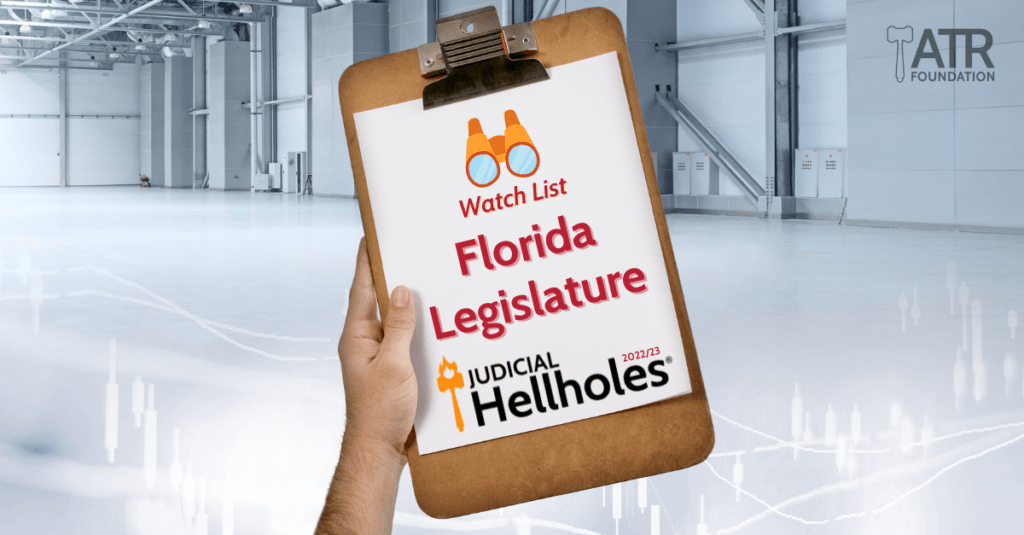‘Highly Unusual’ Rehearing of Louisiana Case Raises Judicial Independence Concerns
Louisiana Supreme Court Waffles Under Political Pressure, ATRA Brief Urges Court to Stand Strong

Lawmakers’ lack of action on legal reform to blame for inclusion
After years of being ranked a “Judicial Hellhole®” by the American Tort Reform Foundation (ATRF), Florida’s Legislature now keeps the state on the report’s “Watch List.”
While Governor Ron DeSantis and the Florida Supreme Court consistently take affirmative steps to address litigation abuses, ATRF says much-needed reforms continue to stall in the Florida Legislature.
“We applaud the legislature for enacting reforms during a special session earlier this year to address the ongoing property insurance crisis in the state, but there is still much work to be done to remove the state once and for all from the Judicial Hellholes® report,” American Tort Reform Association President Tiger Joyce said.
The legislature is expected to address additional property insurance reforms in a special session, scheduled to begin next week.
Florida trial lawyers have long abused what are known as “letters of protection” to inflate damages for medical care. Letters of protection are agreements between a person who needs medical care, his or her lawyer, and a healthcare provider under which the healthcare provider agrees to not seek to collect a fee for medical treatment through the patient’s insurance coverage, but instead wait to collect out of an expected settlement or judgment.
While letters of protection can serve a legitimate purpose when a person is uninsured and unable to pay for medical expenses, some Florida lawyers recommend that their clients avoid using their insurance to cover medical expenses but rely on a letter of protection.
Under Florida law, at trial, jurors only hear evidence of the initially invoiced amount of medical expenses, which is essentially a “sticker price” – often three or more times the amount that is ultimately accepted by the healthcare provider as full payment.
After a verdict, judges are required to adjust the award to reflect the actual amount of medical expenses paid and accepted, a process called a “set off.” But, Florida’s personal injury lawyers often use letters of protection to avoid this set off. By avoiding submission of treatment invoices for payment until after trial, there is no amount paid for a judge to set off the award.
“Legislative reforms can ensure that jurors receive accurate information on the actual value of medical expenses and prohibit abuse of letters of protection,” Joyce said.
Florida is also home to more property insurance lawsuits than the rest of the country combined and remains a hot spot for high-dollar, “nuclear” verdicts. A recent study from the U.S. Chamber’s Institute for Legal Reform found that Florida produced more nuclear verdicts than any other state in the country.
ATRF says the prevalence of nuclear verdicts in Florida can be attributed to a handful of issues including inflated medical damages, the abuse of letters of protection, and large punitive damages awards.
“Lawsuit abuse and excessive tort costs wipe out billions of dollars of economic activity annually,” Joyce said. “While it may be some perceived deep-pocketed company that gets hit with massive verdicts, it’s unfortunately consumers who pay the price in the form of higher costs on goods and services – and now in the midst of record-high inflation.”
Florida residents pay an annual “tort tax” of $812.52 per person and more than 173,000 jobs are lost each year, according to a recent study. If Florida enacted specific reforms targeting lawsuit abuse, the state would increase its gross product by over $17.66 billion.
The 21st edition of the annual report published by ATRF named New Jersey and Texas’ Court of Appeals for the Fifth District (Dallas) to its Watch List, as well as eight ranked Judicial Hellholes®:
The full report is available at JudicialHellholes.org.
Louisiana Supreme Court Waffles Under Political Pressure, ATRA Brief Urges Court to Stand Strong
Left unchecked, these jurisdictions will continue dragging down economic growth and undermining justice through rampant lawsuit abuse.
Claimants Given Opportunity to Vote on Plan; Judge to Reconsider Scientific Validity of Plaintiffs’ Experts
Legitimate consumer protection demands sound science and impartial analysis — not distorted data designed to manufacture lawsuits.
Law Firms Spent $168M+ on 2.2M Ads in Georgia
ATRA’s Latest Studies Reveal Financial Influence and Lack of Transparency in Pennsylvania’s Campaign Finance Systems